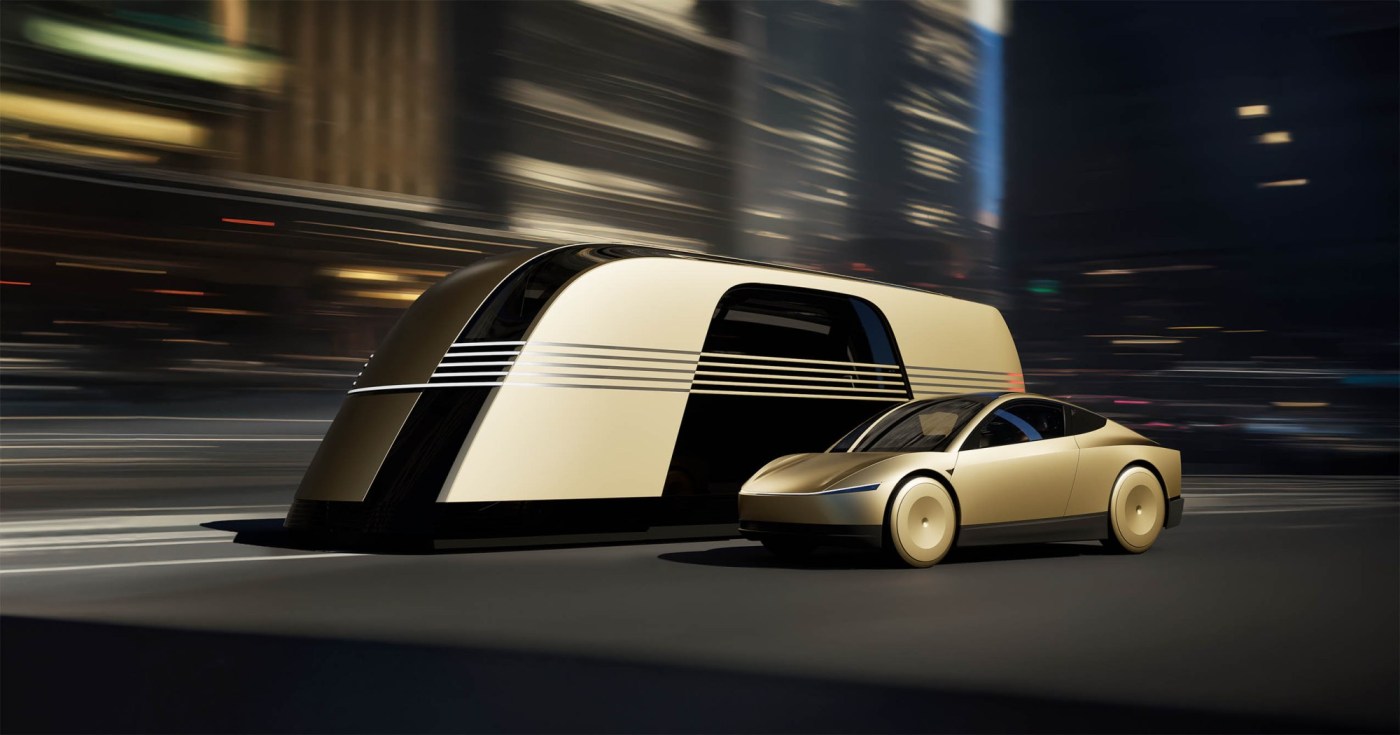By Kara Carlson, Dana Hull and Ed Ludlow | Bloomberg
Elon Musk unveiled Tesla’s highly anticipated self-driving taxi at a flashy Burbank event that was light on specifics, leaving investors questioning how the carmaker expects to achieve its ambitious goals.
The chief executive officer showed off prototypes of a slick two-door sedan called the Cybercab late Thursday, along with a van concept and an updated version of Tesla’s humanoid robot. The robotaxi — which has no steering wheel or pedals — could cost less than $30,000 and “probably” will go into production in 2026, Musk said.
Also see: Can anyone explain the Cybertruck?
The product launch, held on a movie studio lot, didn’t address how Tesla will make the leap from selling advanced driver-assistance features to fully autonomous vehicles. Musk’s presentation lacked technical details and glossed over topics including regulation or whether the company will own and operate its own fleet of Cybercabs.
Elon Musk unveiled Tesla’s highly anticipated self-driving taxi in Burbank on Thursday, Oct. 10. The automaker’s chief executive officer showed off prototypes of a slick two-door sedan called the Cybercab, along with a van concept and an updated version of Tesla’s humanoid robot. (Photo courtesy of Tesla)
Related Articles
Elon Musk makes his first appearance at a Trump rally and casts the election in dire terms
Tesla issues fifth Cybertruck recall in first a year of launch
All the major legal battles Elon Musk and his companies are facing
How your future car could power your California home
“We were illegal immigrants’: Elon Musk is one of illegal immigration’s harshest critics. He once described his past immigration status as a ‘gray area’
As Jefferies analysts put it, Tesla’s robotaxi “toothless.”
The underwhelming event sent Tesla’s shares down 9.3% at 9:31 am Friday in New York, wiping out $69 billion of market value in the biggest intraday decline in more than two months. The stock had risen almost 70% since mid-April, largely in anticipation of the event.
Tesla has a track record of blowing past timelines. Musk has offered for all manner of future products, and has had a particularly difficult time following through on his self-driving forecasts. The CEO told investors in 2019 that Tesla would have more than 1 million robotaxis on the road by the following year. The company hasn’t deployed a single autonomous vehicle in the years since.
“The only specific was the $30,000 for a Cybercab,” said Nancy Tengler, the chief executive officer of Laffer Tengler Investments and a Tesla investor who attended the event. “The concepts were all great. Is the idea super cool? “Absolutely.”
Tesla has for years been selling a suite of features it’s marketed as Full Self-Driving, or FSD, that requires constant supervision and don’t make its vehicles autonomous.
Musk said Thursday the company expects to be able to allow Model 3 and Model Y owners in Texas and California to no longer need to monitor those features sometime next year.
Elon Musk unveiled Tesla’s highly anticipated self-driving taxi in Burbank on Thursday, Oct. 10. The automaker’s chief executive officer showed off prototypes of a slick two-door sedan called the Cybercab, along with a van concept and an updated version of Tesla’s humanoid robot. (Photo courtesy of Tesla)
More on Tesla: Fifth recall issued for Cybertruck
Among the others revealed at the event were a futuristic-looking Robovan concept that Musk said could transport as many as 20 people, plus new versions of the humanoid robot, called Optimus. While the CEO offered a rough sense of when the Cybercab may be ready, he didn’t say when Tesla will make the Robovan.
“Investors we spoke to at the event thought the event was light of real numbers and timelines,” RBC Capital Markets analyst Tom Narayan said in a note. “We would expect shares to trade lower.”
Tesla on Thursday, Oct. 10 unveiled new versions of the humanoid robot called Optimus. (Photo courtesy of Tesla)
Design and timeline
The robotaxi event itself was postponed for two months after Musk ordered changes to the prototype’s design, Bloomberg first reported in July. The Cybercab features doors that open upward like butterfly wings and lacks a steering wheel or pedals.
“They nailed the form factor,” said Gene Munster, managing partner of growth-investment firm Deepwater Asset Management, who went for a ride in one of the prototypes. “But the investor reaction is probably going to be muted because it’s still a long ways away, in terms of the time frame.”
Musk told the crowd gathered at a Warner Bros. Discovery Inc. movie studio lot that consumers will be able to buy the Cybercab, then offered a hedged answer when an attendee asked when it will be available.
“Probably, well I tend to be a little optimistic with time frames, but in 2026,” Musk said. “Before 2027, let me put it that way.”
Trump’s skepticism
US presidential candidate Donald Trump provided fresh indication of the potential for Tesla’s robotaxi to run into regulatory snags in the lead up to Tesla’s party.
Speaking at a Detroit Economic Club event, the Republican nominee questioned whether anybody likes autonomous vehicles and said they were “concerning” to him. It was unclear from his remarks whether he was only singing out cars from China.
“The autonomous vehicles, we’re going to stop from operating on American roads, remember this,” Trump said. Musk endorsed Trump for president in July and has been spending millions of dollars supporting his candidacy.
Missing models
Analysts said ahead of the event that they hoped Tesla would share additional information about the more affordable models Musk has teased for the first half of next year.
The CEO didn’t offer any such updates, casting further doubt on the company’s vehicle sales prospects. The carmaker needs to deliver a record number of cars and trucks in the coming months to avoid its first ever annual decline.
“We were disappointed by the lack of detail regarding Tesla’s near-term product roadmap,” Garrett Nelson, a CFRA Research analyst, said in a note. “We think the event did little to change an opaque intermediate-term earnings outlook.”
–With assistance from Mayumi Negishi, Natalie Choy, Yi Wei Wong and Michael Sin.












